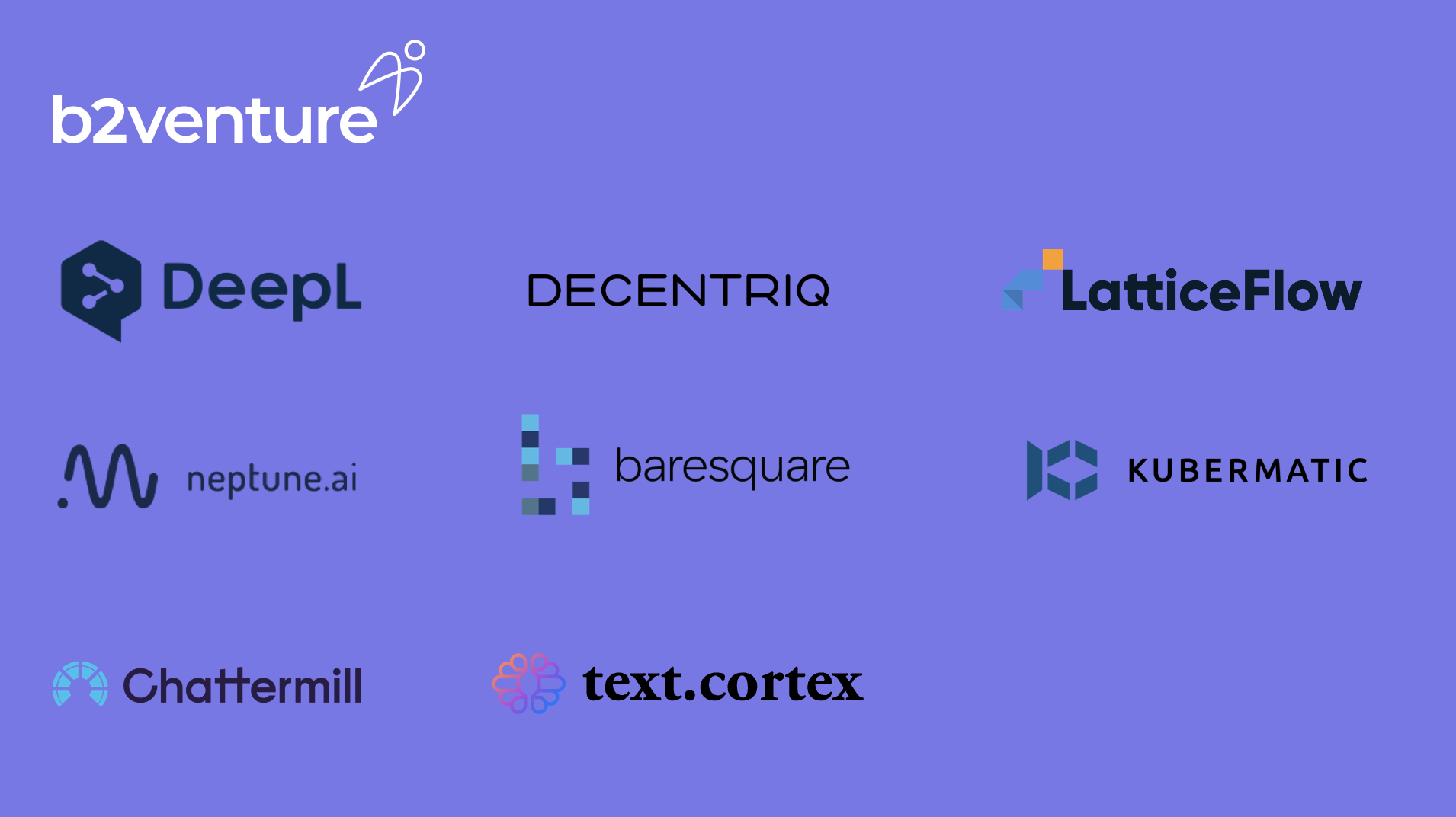Delivering real value as an angel investor
Delivering real value as an angel investor
Matthias Hilpert is a seasoned business angel and sales expert with 23 years of experience in his own startup, as well as in the telecommunication sector with Orange and Vodafone. He is one of the top angels supported by the EIF and has built his reputation on functional expertise — he is known among the b2venture portfolio companies as “Mr. Sales”.

We sat down with Matthias Hilpert to talk about his journey from corporates to angel investing. Matthias believes that working with founders should be viewed as an honor, and that being “coachable” is not always a good thing, and why business angels can sometimes have more influence than institutional investors.
Q: How did you get started with angel investing after your corporate career? Did you get bored with corporates or was it a specific startup that got you on fire?
Startup investing is a bit of a coming home for me. I built my first company right out of university. We were trying to build a portal operation and move that into the mobile phone as opposed to the desktop. That basically got me started in startups, including VC funding, building teams, building the business from ground up. It was almost an accident that I ended up in the corporate world and even there, I was more like an intrapreneur, building up new teams. In the later part of my corporate career, when I was working for private equity investors essentially, that was a very different environment. That already got me a bit more back in the startup world because it is much more of a high-performance environment as opposed to the safer corporate world. But I like it that way. After that, I decided to just go back into the startup world. This time, not as a founder, but as an investor. Obviously in the beginning of my career, I didn’t have any money, so founding was the only choice, but now I have more freedom to choose what to do. And quite frankly, it’s something that I do not regret at all because it’s really a pleasure to collaborate with top talent.
Founders are a small segment of our society that really drive positive change for the future. For me, it’s an honor to collaborate with them and support them with capital, but more importantly with my experience, including the emotional stamina that is needed to survive the roller coaster of startup life.
Q: What did you focus on initially? Any industry or stage preferences? Or basically anywhere where you can add value?
I made a plan for myself when I decided to spend the majority of my time doing angel investing. I wanted to do it a professional manner. Therefore, it was good for me to lay out a plan about what to do and what not to do. I made the choice not to focus on telecoms although it’s where I come from. Telecoms is a really tough industry for startups. It’s an oligopoly with terrible purchasing teams that can run ragged startups for many months and sometimes years. So it’s not a very good investment environment to start. What I do focus on is what I have learned within that industry, in particular how digital business models work and how to commercialize them. Today I have quite a lot of criteria for refining my focus. In terms of the stage, it is Seed and Series A, not pre-Seed.
Q: If you were starting over today, would you do anything differently?
No, I’m quite happy with the plan, to be fair. I read a lot and I talked to quite a few people in the business prior to me really engaging. I would recommend that you build a really broad portfolio. I have about twenty-five companies in my portfolio right now and initially did very small tickets until I understood what’s working and what not. For me this approach allowed me to learn from other people and to approach things from different angles, and help me get a better idea of what the whole investment business is about. It was very helpful just to start small and make sure that I invest enough time in it.
Q: You invest money plus your time — and you’re also advising not just the b2venture portfolio companies on sales, but probably also other companies. How do you approach strategic sparring?
I do that selectively. Out of my twenty-five portfolio companies, there are maybe five where I am motivated enough to really go deep. And a situation where the company, the people and the founders fit, that’s not happening with every company because there’s just not enough time. And not every company really needs it. Some founders are further ahead with their strategy than their operations. (And vice versa?).
Q: How do you assess in your personal due diligence whether a team is coachable and will be open to take on what you are able to teach them?
Let me define what being coachable means a bit better, because it’s not always a good thing. If you don’t really know yourself or you don’t have a strong opinion, but you basically do what the last guy that is older than you told you, that’s not really very promising. Something I had to learn was that some of the most quirky founders are the most successful ones, because they’re incredibly gritty and persistent, and they don’t take no for an answer. And that’s just mind-blowing, because you’re thinking “what’s this guy doing”? But with all the persistence, with all the grit, they go somewhere. And then you have the MBA from an established school who is very keen to get the senior guys to coach him, but you don’t really have that persistence, the tolerance for pain or the ambiguity, and then they are too coachable. If they agree with everything you’re saying, that’s a bad sign. If they disagree with everything, it’s also a bad sign. Somewhere in the middle, when there’s really deep arguments and then an open outcome based on the arguments, that I think is the best way to define coachable.
Q: What’s your definition of a small ticket? Is an investment of 10k sensible today or does it harm the cap table?
It really depends on the stage and on the capital available to you. In 2007 it was EUR 10k, nowadays, I think EUR 25k is a rather small ticket. However, it oscillates anywhere between 10k and 100k. And if you put EUR 100k in, that’s quite a large ticket for a first investment. You also need to make sure that you understand the difference between first investment and follow-on investments. I do hundreds of thousands in follow-on investments, but only in the winners.
Generally speaking, a EUR 10k ticket is not a very strong commitment, but it depends on the type of company and the type of round. In a competitive round with a top-tier company, founder and market, nobody would ever get in with a EUR 10k ticket. If it’s a mediocre company with a mediocre cap table and investment round, you may get in with a EUR 10k ticket. If the business angel’s net worth is not large enough to do several 25k tickets and spend about half a million on it, then it’s just not the right business for that person. It should not be a huge amount of your net worth and it should not be concentrated only on very few companies. Otherwise, this would be more like a hobby and support of individuals that you simply like.
Q: Do you charge in terms of sweat equity? Do you ask for extra percentage points for X hours of consulting?
As an exception. That happens, but what I do have to deliver real value. However, I would proceed with caution, because usually the founders should really be begging you for doing this instead of you suggesting it to them. I mean, there are so many shady guys running around asking for a bit of ESOP / VSOP and then don’t deliver value. You don’t want to be associated with that type of segment. You should really provide exceptional value in order to be able to talk about this. You can burn your image very quickly as it’s a small world, so I would be very careful on that. 99 times out of 100 it’s not a good idea and I say that with 20 years’ experience.
Q: Is there a level of influence and control that you insist on having with companies that you invest in?
Not at all. I mean we’re talking about less than a percent most of the time. So legally speaking, there is zero control and influence. However, if I deliver value , I believe I can have a profound influence on the founders, sometimes a lot stronger than institutional investors with 20 percent.
Simply because I spend more time with them and have a better rapport with them. I don’t really want to call it control, but this is where mentoring and where guiding people in the right direction is possible. If you need hierarchical or legal control, you’re in the wrong business.
Q: What was your growth curve from when you started in terms of your strategy and portfolio development?
My plan was to set boundaries for myself. I decided to do this for five years and after five years to take stock and see whether I was good at it. And in those five years, I would do only one investment per quarter to not get overly excited and do like five investments. This gives me good yield over the years, and I also get to see a broad variety of companies because the market moves in waves. Every quarter there’s a new set of companies looking for funding, so you don’t want to invest too much in one quarter, but really spread it out. If you take this portfolio construction, my own personal emotional energy, excitement and everything else together, that’s really what my starting strategy was. I went in, thinking, I’m king of the world, as usual. Then I got a real eye-opener in the first year, realizing I didn’t really know so much about it all. The second year was much clearer for me, I had initial pattern recognition about what to look at and what not. I think I really started to know my way around by the third year and that has compounded over the last few years. There’s quite a learning curve, and we’re talking years as opposed to months.
Matthias Hilpert is a seasoned business angel and sales expert with 23 years of experience in his own startup, as well as in the telecommunication sector with Orange and Vodafone. He is one of the top angels supported by the EIF and has built his reputation on functional expertise — he is known among the b2venture portfolio companies as “Mr. Sales”.

We sat down with Matthias Hilpert to talk about his journey from corporates to angel investing. Matthias believes that working with founders should be viewed as an honor, and that being “coachable” is not always a good thing, and why business angels can sometimes have more influence than institutional investors.
Q: How did you get started with angel investing after your corporate career? Did you get bored with corporates or was it a specific startup that got you on fire?
Startup investing is a bit of a coming home for me. I built my first company right out of university. We were trying to build a portal operation and move that into the mobile phone as opposed to the desktop. That basically got me started in startups, including VC funding, building teams, building the business from ground up. It was almost an accident that I ended up in the corporate world and even there, I was more like an intrapreneur, building up new teams. In the later part of my corporate career, when I was working for private equity investors essentially, that was a very different environment. That already got me a bit more back in the startup world because it is much more of a high-performance environment as opposed to the safer corporate world. But I like it that way. After that, I decided to just go back into the startup world. This time, not as a founder, but as an investor. Obviously in the beginning of my career, I didn’t have any money, so founding was the only choice, but now I have more freedom to choose what to do. And quite frankly, it’s something that I do not regret at all because it’s really a pleasure to collaborate with top talent.
Founders are a small segment of our society that really drive positive change for the future. For me, it’s an honor to collaborate with them and support them with capital, but more importantly with my experience, including the emotional stamina that is needed to survive the roller coaster of startup life.
Q: What did you focus on initially? Any industry or stage preferences? Or basically anywhere where you can add value?
I made a plan for myself when I decided to spend the majority of my time doing angel investing. I wanted to do it a professional manner. Therefore, it was good for me to lay out a plan about what to do and what not to do. I made the choice not to focus on telecoms although it’s where I come from. Telecoms is a really tough industry for startups. It’s an oligopoly with terrible purchasing teams that can run ragged startups for many months and sometimes years. So it’s not a very good investment environment to start. What I do focus on is what I have learned within that industry, in particular how digital business models work and how to commercialize them. Today I have quite a lot of criteria for refining my focus. In terms of the stage, it is Seed and Series A, not pre-Seed.
Q: If you were starting over today, would you do anything differently?
No, I’m quite happy with the plan, to be fair. I read a lot and I talked to quite a few people in the business prior to me really engaging. I would recommend that you build a really broad portfolio. I have about twenty-five companies in my portfolio right now and initially did very small tickets until I understood what’s working and what not. For me this approach allowed me to learn from other people and to approach things from different angles, and help me get a better idea of what the whole investment business is about. It was very helpful just to start small and make sure that I invest enough time in it.
Q: You invest money plus your time — and you’re also advising not just the b2venture portfolio companies on sales, but probably also other companies. How do you approach strategic sparring?
I do that selectively. Out of my twenty-five portfolio companies, there are maybe five where I am motivated enough to really go deep. And a situation where the company, the people and the founders fit, that’s not happening with every company because there’s just not enough time. And not every company really needs it. Some founders are further ahead with their strategy than their operations. (And vice versa?).
Q: How do you assess in your personal due diligence whether a team is coachable and will be open to take on what you are able to teach them?
Let me define what being coachable means a bit better, because it’s not always a good thing. If you don’t really know yourself or you don’t have a strong opinion, but you basically do what the last guy that is older than you told you, that’s not really very promising. Something I had to learn was that some of the most quirky founders are the most successful ones, because they’re incredibly gritty and persistent, and they don’t take no for an answer. And that’s just mind-blowing, because you’re thinking “what’s this guy doing”? But with all the persistence, with all the grit, they go somewhere. And then you have the MBA from an established school who is very keen to get the senior guys to coach him, but you don’t really have that persistence, the tolerance for pain or the ambiguity, and then they are too coachable. If they agree with everything you’re saying, that’s a bad sign. If they disagree with everything, it’s also a bad sign. Somewhere in the middle, when there’s really deep arguments and then an open outcome based on the arguments, that I think is the best way to define coachable.
Q: What’s your definition of a small ticket? Is an investment of 10k sensible today or does it harm the cap table?
It really depends on the stage and on the capital available to you. In 2007 it was EUR 10k, nowadays, I think EUR 25k is a rather small ticket. However, it oscillates anywhere between 10k and 100k. And if you put EUR 100k in, that’s quite a large ticket for a first investment. You also need to make sure that you understand the difference between first investment and follow-on investments. I do hundreds of thousands in follow-on investments, but only in the winners.
Generally speaking, a EUR 10k ticket is not a very strong commitment, but it depends on the type of company and the type of round. In a competitive round with a top-tier company, founder and market, nobody would ever get in with a EUR 10k ticket. If it’s a mediocre company with a mediocre cap table and investment round, you may get in with a EUR 10k ticket. If the business angel’s net worth is not large enough to do several 25k tickets and spend about half a million on it, then it’s just not the right business for that person. It should not be a huge amount of your net worth and it should not be concentrated only on very few companies. Otherwise, this would be more like a hobby and support of individuals that you simply like.
Q: Do you charge in terms of sweat equity? Do you ask for extra percentage points for X hours of consulting?
As an exception. That happens, but what I do have to deliver real value. However, I would proceed with caution, because usually the founders should really be begging you for doing this instead of you suggesting it to them. I mean, there are so many shady guys running around asking for a bit of ESOP / VSOP and then don’t deliver value. You don’t want to be associated with that type of segment. You should really provide exceptional value in order to be able to talk about this. You can burn your image very quickly as it’s a small world, so I would be very careful on that. 99 times out of 100 it’s not a good idea and I say that with 20 years’ experience.
Q: Is there a level of influence and control that you insist on having with companies that you invest in?
Not at all. I mean we’re talking about less than a percent most of the time. So legally speaking, there is zero control and influence. However, if I deliver value , I believe I can have a profound influence on the founders, sometimes a lot stronger than institutional investors with 20 percent.
Simply because I spend more time with them and have a better rapport with them. I don’t really want to call it control, but this is where mentoring and where guiding people in the right direction is possible. If you need hierarchical or legal control, you’re in the wrong business.
Q: What was your growth curve from when you started in terms of your strategy and portfolio development?
My plan was to set boundaries for myself. I decided to do this for five years and after five years to take stock and see whether I was good at it. And in those five years, I would do only one investment per quarter to not get overly excited and do like five investments. This gives me good yield over the years, and I also get to see a broad variety of companies because the market moves in waves. Every quarter there’s a new set of companies looking for funding, so you don’t want to invest too much in one quarter, but really spread it out. If you take this portfolio construction, my own personal emotional energy, excitement and everything else together, that’s really what my starting strategy was. I went in, thinking, I’m king of the world, as usual. Then I got a real eye-opener in the first year, realizing I didn’t really know so much about it all. The second year was much clearer for me, I had initial pattern recognition about what to look at and what not. I think I really started to know my way around by the third year and that has compounded over the last few years. There’s quite a learning curve, and we’re talking years as opposed to months.

The Author
By Chase Gummer
Team







.jpg)












.png)




.jpg)
-min.png)


.jpg)














































.jpg)




















